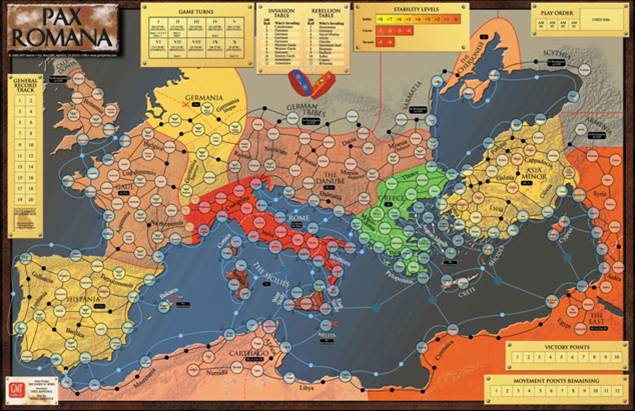Design Team Members: Phil McClelland and Simon Whitmell
Supervisor: Dr. Stacey Scott, Dr. Neil Randall (project advisor)
Background
Historical board gaming, or “wargaming”, is a genre of combat and strategy games which deal with actual historical conflicts. Developed by University of Waterloo professor Neil Randall, Pax Romana is a board wargame which covers the political and military history of the Mediterranean from the third century BCE through to the end of the first century CE. This is a complicated game with hundreds of game pieces and dozens of pages of intricate rules. The rules require frequent use of tables and formulas to calculate various game effects, and gameplay itself can span 40 hours or more for a single campaign.

Figure 1: Pax Romana Board (Image courtesy of GMT games, used with permission)
The complexity of Pax Romana and similar games in its genre has long been a barrier to new players. In order to make the game easier to learn and play, a technological solution was sought in order to automate some of the game’s more complex aspects, while endeavoring to maintain the social and strategic elements which make the game “fun”.
The Collaborative Systems Lab at the University of Waterloo, under the direction of Dr. Stacey Scott, is focused on “the development of novel interface and interaction techniques for interactive, large-screen wall and tabletop systems and applying these interface technologies to complex team domain contexts.” The digital tabletop technology explored in this lab allows for large areas of tabletop space to be used as large-screen, touch-sensitive displays. It is this digital tabletop technology that we intend to apply to the field of strategic board gaming in order to reduce the less enjoyable cognitive demands on players while maintaining the feel of playing a physical board game.
Project description
The stated objectives for this project are:
- Develop and interactive medium fidelity prototype of the tabletop strategy game “Pax Romana”.
- Explore user collaboration and group dynamics while learning and playing board games.
- Develop tools for facilitating external cognition while playing the game.
- Develop an intuitive interaction paradigm for playing board games on a large format touch screen.
- Develop an enhanced high fidelity prototype of the game.
The intent of the project is to have a playable digital version of the game with which to test interface designs and their effect on the game experience, and to create a platform upon which future research in the area of digital tabletop gaming can be performed
Design methodology
Requirements
Because the original board game exists and serves as a de-facto low fidelity prototype, the project will use the game to perform initial testing and requirements gathering.
Prototype
The
requirements
collected
from
testing
the
original
game
will
be
used
to
develop
a
digital
version
of
the
game
which
will
facilitate
playing
the
original
game
with
little
or
no
automation
Testing
The
digital
version
of
the
game
will
be
tested
on
new
users
to
determine
ways
in
which
it
can
be
improved
in
order
to
streamline
the
processes
of
learning
and
playing
the
game.
Refinement
Based
on
the
testing
results,
tools
and
functionality
will
be
added
or
improved
to
make
the
game
easier
to
learn
and
play.
Iteration
As
the
refined
digital
version
is
used
by
both
new
and
experienced
users,
observations
will
continue
to
be
made
on
how
the
users
play
the
game,
and
how
their
social
interactions
change
as
a
result
of
the
shift
to
a
digital
medium,
informing
future
design
refinements